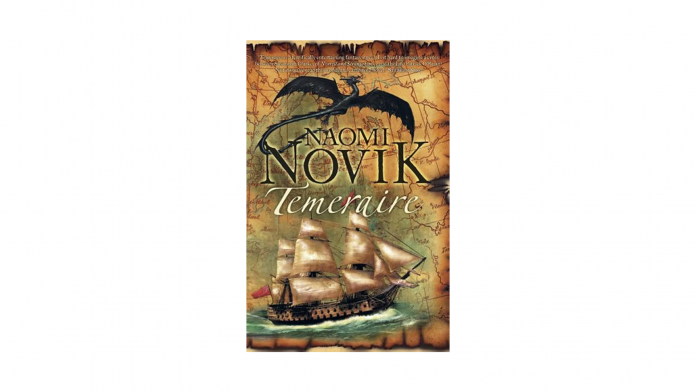I paint a lot, and that means I burn through a lot of audiobooks. I’m also a sucker who will buy any book with a dragon on the front cover, a weakness that has done me wrong more than once. But with Naomi Novik’s series Temeraire I have found myself entirely satisfied.
Temeraire is set in an alternate Earth during the Napoleonic wars, with the single distinction that dragons are real. While this may seem a simple, almost trivial change at first, the heart of these books is a profound contemplation of the full military, social and cultural implications of their presence. At the most basic, dragons do not fight alone or with a single rider – they wear elaborate harnesses crewed by forty or more men and women armed with a variety of rifles, grenades and cutlasses for boarding actions. This makes riding a dragon more akin to captaining a ship, and the gentlemanly naval Captain Lawrence finds himself having many transferable skills. Following from this are the details of dragon weight classes, with smaller dragons used as scouts, messengers and outriders, heavyweights used as formation centrepieces, and the rare fire or acid breathing varieties used as the core firepower that entire flight missions are built around. Soon you’ll find yourself with a fascinating tactical situation – and one being played to perfection by the dashing Emperor Napoleon, who turns out to be a natural innovator when it comes to the use of the French air force.
So it’s to the series’ credit that the first book is a sports movie. A team of loveable misfits come together to learn new skills, work as a team, and overcome a powerful enemy to save Great Britain. The simple structure of the story keeps things under control while it’s teaching you the complexities of dragons, aviators and how they fit into military and social structures. Here and there you get some strange glimpses of the wider world but for now the series keeps things self contained. It’s an excellent way to introduce a big, weird fantasy setting; by keeping the first book in the series down to earth it’s not too much and not too fast, but by the end of it you’ll find yourself full of questions. There are a lot of contradictions in the book, and by the time you’ve learned the rules you’ll start to question if the rules are in any way fair or equitable.
And that’s when the series really gets going. Book two involves a journey to China, which has dragons as highly educated citizens and members of the government rather than militarized beasts of war – something the militarized beasts of war that are the British dragons find shocking and eye-opening. Immediately grim muttering about pay and rights begins, and here’s where the series comes into its own revolutionary identity. Captain Lawrence, who by inclination would be an apolitical naval officer dedicated to King and Country, finds politics thrust upon him, and he gradually works up the courage required to rise to the challenge.
Here too is where the depths of thought behind the setting start coming out. The parallel with African slavery is obvious enough, but it turns out that Lord Nelson survived Trafalgar – severely burned as a dragon overflew his ship, but alive – and immediately throws the weight of his legendary reputation behind the cause of maintaining slavery. The Duke of Wellington finds himself forced to negotiate with mutinous dragons in the field and is not at all happy with the prospect. Further out, the historical trajectory of colonization has followed very different paths: the massive, localized military force represented by dragons meant that Spain never conquered the Americas, for example.
All of the changes drive the plot and politics, but nothing is forced: every change feels like an inevitable outgrowth of the assumption of dragons, and the alternate history of this world adds a fascinating tension to moments that would otherwise feel historically inevitable. When Napoleon decides to invade England by air rather than march on Russia, history seems to lurch beneath your feet. Why wouldn’t he? England is far closer and far more vulnerable to an airmobile Grand Armee than Russia, there is no General Winter to undo his army, it’s the obvious choice – but this decision also undoes the historic inevitability of his defeat. If he is to be defeated, it must be on this setting’s terms. The entire shape of the era becomes different when London falls, but none of the decisions are the slightest bit out of character for any of the historical figures involved. All that’s changed are the dragons, but that change is explored to its fullest extent.
So I recommend Temeraire extremely highly. Moment to moment, the action is sharp and punchy, adventures in exotic lands and battles with fist, musket and dragonfire. The politics are carefully considered and fascinatingly unpredictable; close enough to reality to be recognizable, but far enough to be surprising. Nothing is skipped when it comes to battle tactics or logistics – moving around massive carnivorous flying monsters is a difficult prospect and the books spare no detail about how this feat is managed. And sometimes the books are just extremely funny and clever. Dragons are grand and intelligent, certainly, but they are also greedy, slothful and envious beasts with a wilful failure to comprehend property rights when it comes to cattle that they want to eat (and an intensely vested interest in it when it comes to treasure that they possess).
There are nine books in the series, each one about 12 hours as an audiobook, and the series improves in quality the longer it goes. Especially should you happen to be painting Napoleonics then you would be hard pressed to find better listening.
Have any questions or feedback? Drop us a note in the comments below or email us at contact@goonhammer.com.


